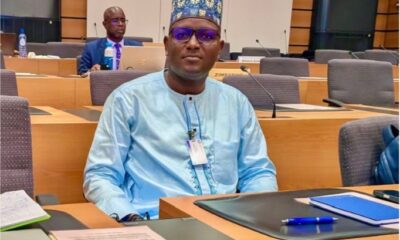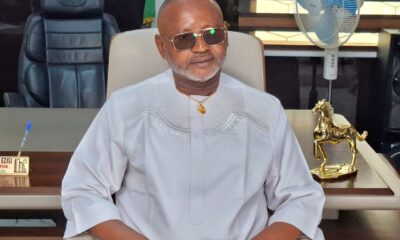Customs Report
Nigeria Customs Launch B-Odogwu Pilot Scheme
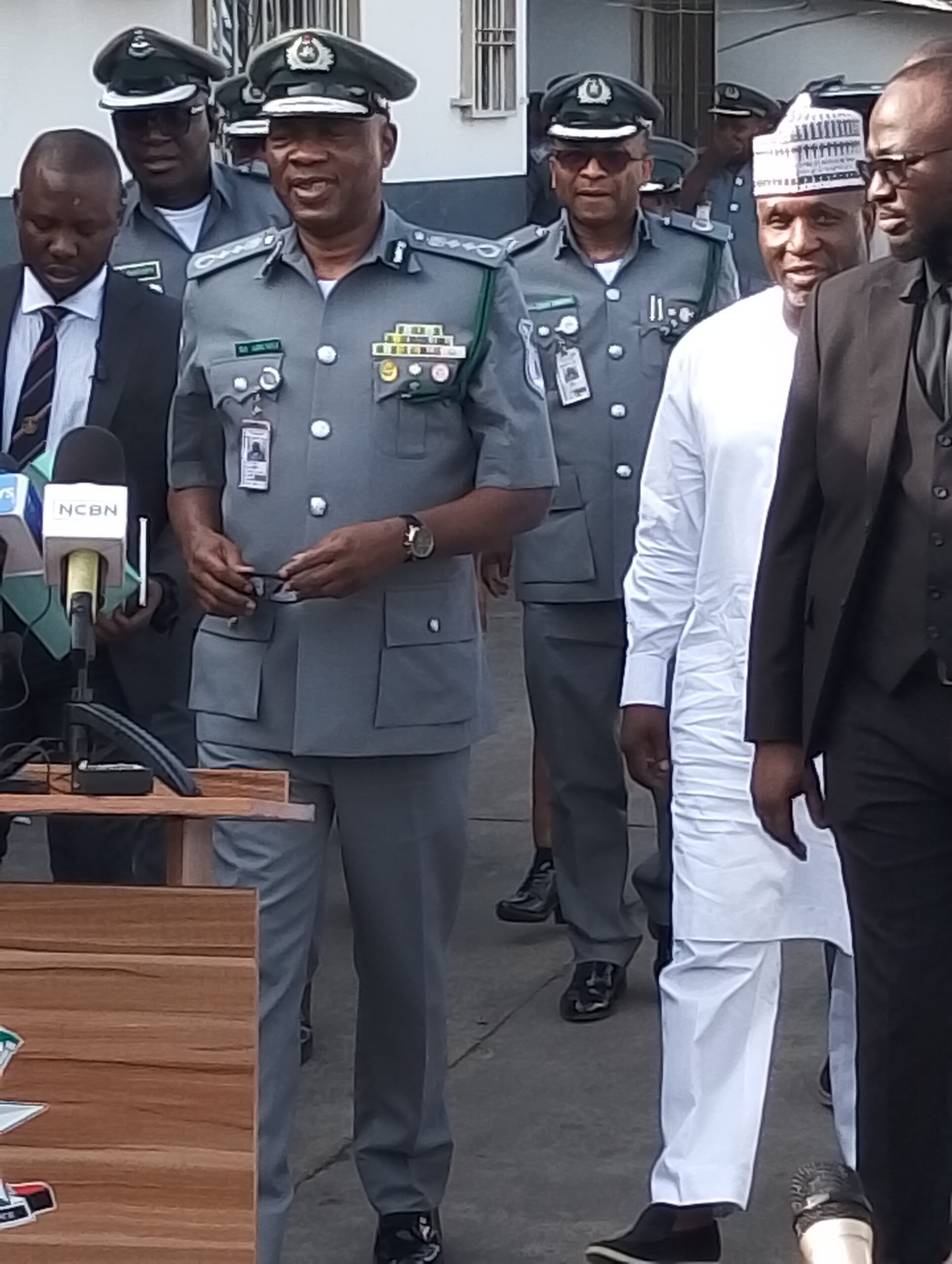
…As Adeniyi Sets Exit Timeline for Webb Fontaine, NICIS 11
BY FUNMI ALUKO
The Nigeria Customs Service, Wednesday, at the Ports Multipurpose Terminal Limited (PTML) area command, launched the pilot scheme of its new cargo documentation processing system christened B-Odogwu.
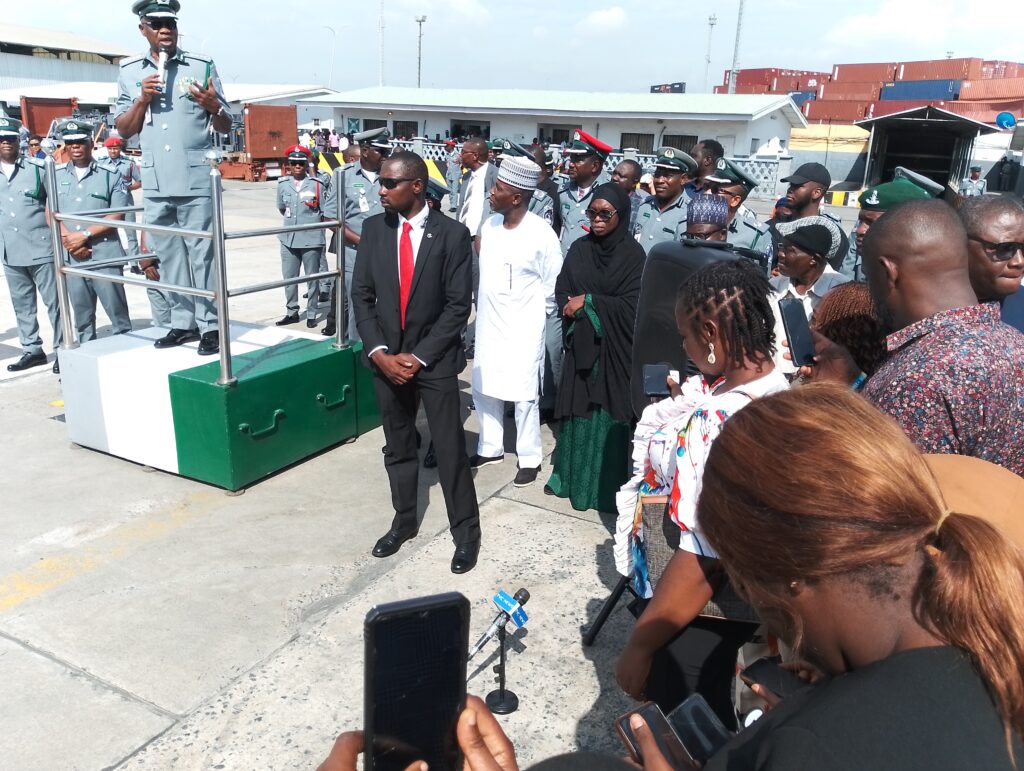
Adeniyi addressing his officers and men at the PTML Terminal
On ground to flag off the pilot scheme, the Comptroller General of Customs, Bashir Adewale Adeniyi expressed confidence that the initiative will end up a success as he explained that the service is poised to learn from whatever start-up hiccups may arise, proceed to retool and with undivided commitment make it a success and thereafter, escalate its application in all port commands.
Addressing the media after a motivational session with his officers and men at the PTML Command, Adeniyi said the development also signals the end of Webb Fontaine contract with the service, as well as the beginning of the scrapping of NICSIS 11, the last cargo documentation module developed by the ICT firm.
According to the CGC, although Webb Fontaine’s contract with the service has officially lapsed since December 2021, the firm has continue to provide the services it was contracted to give, despite doing so below expected capacity, which the customs boss explained became a source of grief for the service and stakeholders.
He said B-Odogwu is a child of necessity that the service technical team responded to in a rather robust manner, making the NCS a proud developer of an important trade application which name will henceforth resonate within the World Customs Organisation as an indigenous trade tool. He explained that B-Odogwu is a product of both the NCS and Customs Trade Modernization Project (TMP).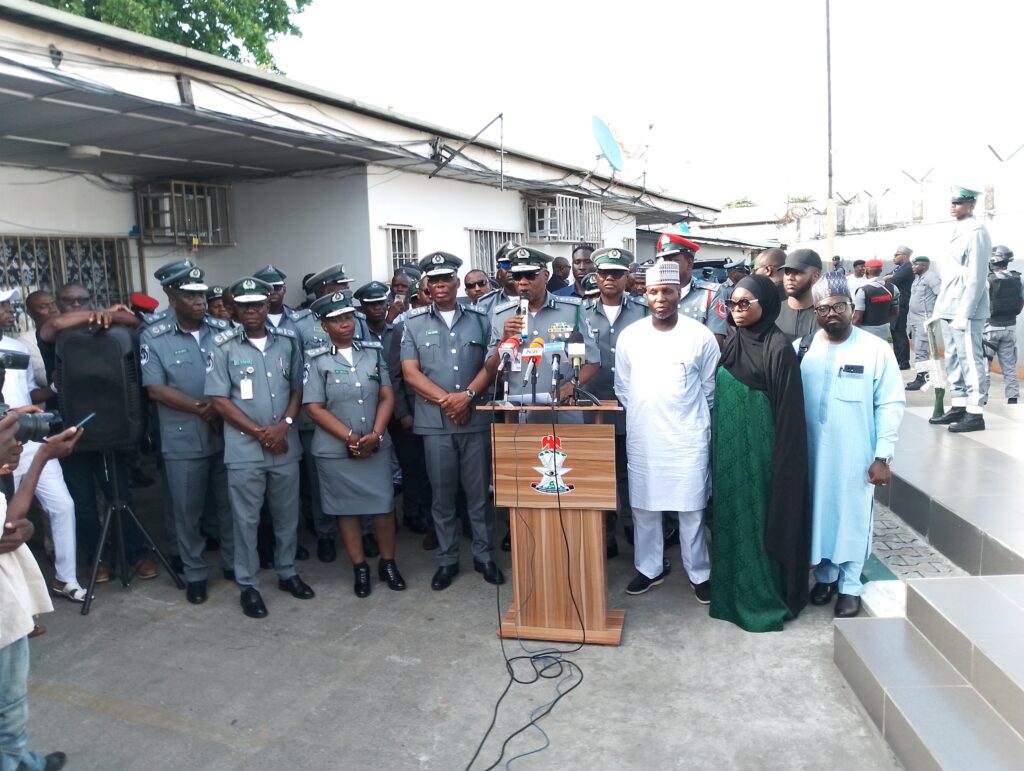
“This platform is a product of direct collaboration between Nigeria Custom Service and the Trade Modernization Projects team (TMP). And I’m happy that I have with me the chairman of TMP, Alhaji Sale Ahmadu, who is also here with his team.
“This approach was necessitated by our experiences with previous service providers who, despite multiple contract extensions, failed to meet their deliverables and effect the expected handover at the end of their contract period, while we would have preferred a different outcome to those contracts, this situation has strengthened our resolve to develop indigenous solutions that truly serve our needs.
“It is disappointing when organizations failed to leverage their extended presence in Nigeria to build credible reputations that could benefit them, both locally and internationally. And I’m being very, very careful in the selection of my words that the end of our contractual obligations of Webb Fontaine with Nigerian Customs Service has not been as expected. We are not happy with the way it has gone, but we don’t have a choice, we have decided to move on with our life”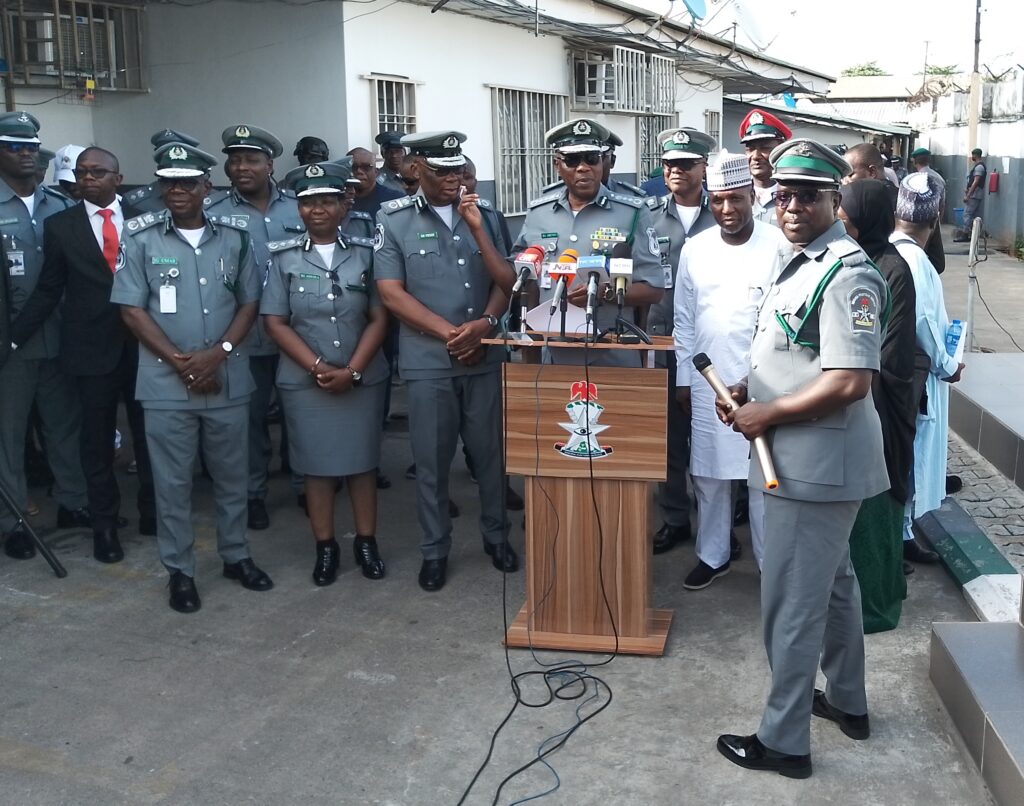
Giving further insight into the pilot scheme of the new technology, the CGC said, “We’ve taken the bold decision to launch this new initiative and take on the processing of customs declaration through the new system that has been developed. While we look ahead, B Odogwu is our new customs management system that embodies our vision for a paperless Customs Administration, which facilitates seamless trade while maintaining robust security measures.
“The system will enhance our ability to streamline end-to-end business processes, to provide stakeholders with customized integration capabilities to support efficient and intelligent business decisions and to facilitate the ease of doing business. I am pleased to inform you that B Odogwu is one of the main deliverables of the Nigerian Custom Service modernization project.”

Adeniyi informed that stakeholders have been adequately carried along with the new application and expressed optimism that all stakeholders will familiarize with B-Odogwu following the flag off in PTML. He also expressed the readiness of the NCS to quickly have a walk over whatever teething problems that may be thrown up during the trial period, assuring that the service technical corps involved in the development and running of the system are up to the task.
“In the last one hour l have been having engagement with our stakeholders, the terminal operators on a major landmark development. It is for on the spot assessment of the roll-out of ‘B Odogwu’ and that is our new unified customs management system. It is indeed an important achievement and a significant milestone in our journey towards modernizing Nigeria customs operations and aligning those operations with global best practice.
“The exercise that we are undergoing is firmly rooted in the policy force of the customs management upon my assumption of office, and this emphasizes the need to consolidate on the previous gains while boldly embracing innovative solutions to long standing challenges. This policy is also aligned with the strategic objectives of President Bola Ahmed Tinubu led administration to make customs more effective and efficient for the benefit of Nigerians.
“The support for the actualization of this has been midwife by the Honorable Minister of Finance and Coordinating Minister of the Economy and the Chairman of the Nigeria Customs Board in the implementation of several initiatives, including the roll-out of the pilot scheme of B-Odogwu that epitomizes our drive to adapt and adopt cutting edge technology to enhance our processes and our procedures.”
On the choice of PTML Command for the system’s pilot trail test, Adeniyi explained that it is the leading model port and hence serves as the best area command to undertake the scheme.
“There are other factors that support our roll out and influenced the decision of this terminal. The first is the exemplary history of smooth interactions between customs and stakeholders in this terminal. The second one speaks to the availability of modern infrastructure provided by the terminal operator. Thirdly the substantial volume of transactions processed through this facility and finally; PTML’s successful track record as a model port for previous ground breaking NCS initiatives.”
He continued: “Since the commencement of pilot activities, we have made significant strides in preparing for this roll-out. Different users of the systems have been trained to be familiar with a more simplified interface and the new tools at their disposal.
“This terminal has received upgraded network infrastructure to meet modern demands, as we will see more complexities in declarations and address the peculiarities in our trade system, I can confidently say that the era of network downtime would be behind us. Furthermore, we have successfully tested and we are now ready to deploy integration APIs with our key partners in the trade supply chains, including our banks, shipping lines, bonded warehouses and partner government agencies.
“Our stakeholders’ interactions to sensitize traders and agents on board have yielded overwhelming positive feedback. We will continue to engage and listen to their concerns, and I assure you that Odogwu is here to stay, and we will address those concerns effectively. Today, therefore marks a significant milestone as we commence users’ creation on Odogwu, which will give users access to their work environment within a unified platform.”
He explained that management is not unaware of the possibility of initial hiccups and assured that such challenges will be taken care of as the come; assuring that acceptable level of consistency and standard will soon be achieved after which B-Odogwu shall become an important factor in customs trade.
“I want to address an important point up front. Yes, we do anticipate some technical challenges during this roll out phase. This is normal with any new system implementation, and it should not cause us any alarm. We have positioned a dedicated team of technical experts to provide immediate support and ensure a smooth transition as much as possible. This team will be available round the clock to address any issue that may arise.
“l want to imagine that if documentation is fine, if there are no issues with documents that are submitted, what Odogwu promises us is even better infrastructure, so we are going to have a better, swifter processes of documents.
“I don’t want you to hold me down to time now, what we are doing is that we are running a pilot and as we run this pilot, we will take our lessons, we will make mistakes, we will correct them, we will see gaps, we will cover them, so that by the time we announce that we have finished pilot and we are willing to roll out, then you can hold us accountable when say it takes us two hours, three hours to process PAAR, to process any declaration.”





